TBC Organisational Change Development Plan
VerifiedAdded on 2023/06/18
|12
|5214
|323
AI Summary
This report discusses the need for change in the NHS and provides recommendations for managing organisational change within the healthcare setting. It covers types of change, dimensions of change, power, political and conflict on changes, and social consequences within the NHS. The report suggests that NHS should adopt an approach of intelligence through the implementation of strategic application.
Contribute Materials
Your contribution can guide someone’s learning journey. Share your
documents today.
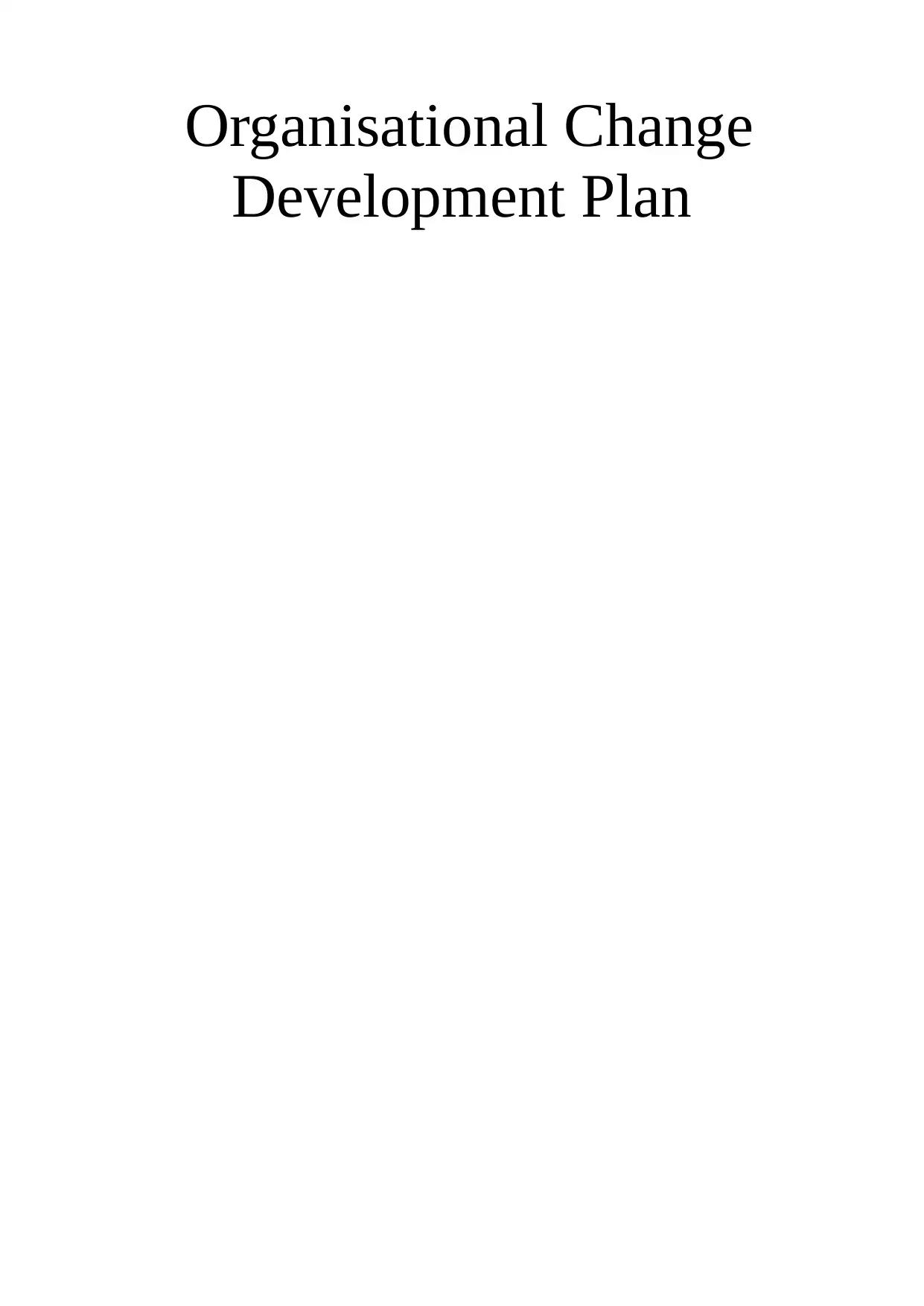
Organisational Change
Development Plan
Development Plan
Secure Best Marks with AI Grader
Need help grading? Try our AI Grader for instant feedback on your assignments.

Table of Contents
INTRODUCTION ...............................................................................................................................3
MAIN BODY ......................................................................................................................................3
Types Of Change .................................................................................................................................5
Dimensions Of Change ........................................................................................................................5
Power, Political And Conflict On Changes .........................................................................................5
Recommendations For Manage Change In NHS ................................................................................5
CONCLUSION....................................................................................................................................5
REFERENCES ....................................................................................................................................6
INTRODUCTION ...............................................................................................................................3
MAIN BODY ......................................................................................................................................3
Types Of Change .................................................................................................................................5
Dimensions Of Change ........................................................................................................................5
Power, Political And Conflict On Changes .........................................................................................5
Recommendations For Manage Change In NHS ................................................................................5
CONCLUSION....................................................................................................................................5
REFERENCES ....................................................................................................................................6
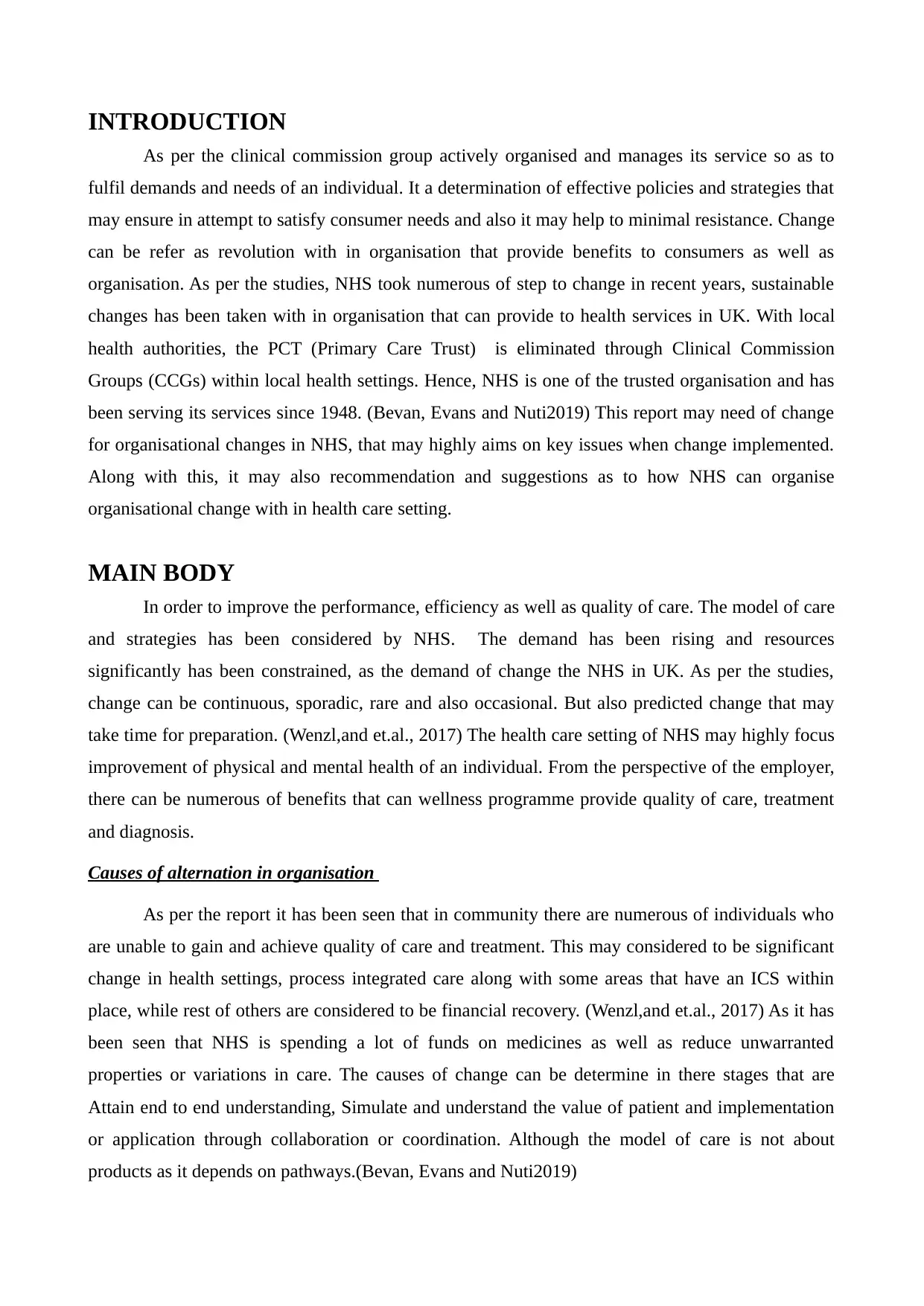
INTRODUCTION
As per the clinical commission group actively organised and manages its service so as to
fulfil demands and needs of an individual. It a determination of effective policies and strategies that
may ensure in attempt to satisfy consumer needs and also it may help to minimal resistance. Change
can be refer as revolution with in organisation that provide benefits to consumers as well as
organisation. As per the studies, NHS took numerous of step to change in recent years, sustainable
changes has been taken with in organisation that can provide to health services in UK. With local
health authorities, the PCT (Primary Care Trust) is eliminated through Clinical Commission
Groups (CCGs) within local health settings. Hence, NHS is one of the trusted organisation and has
been serving its services since 1948. (Bevan, Evans and Nuti2019) This report may need of change
for organisational changes in NHS, that may highly aims on key issues when change implemented.
Along with this, it may also recommendation and suggestions as to how NHS can organise
organisational change with in health care setting.
MAIN BODY
In order to improve the performance, efficiency as well as quality of care. The model of care
and strategies has been considered by NHS. The demand has been rising and resources
significantly has been constrained, as the demand of change the NHS in UK. As per the studies,
change can be continuous, sporadic, rare and also occasional. But also predicted change that may
take time for preparation. (Wenzl,and et.al., 2017) The health care setting of NHS may highly focus
improvement of physical and mental health of an individual. From the perspective of the employer,
there can be numerous of benefits that can wellness programme provide quality of care, treatment
and diagnosis.
Causes of alternation in organisation
As per the report it has been seen that in community there are numerous of individuals who
are unable to gain and achieve quality of care and treatment. This may considered to be significant
change in health settings, process integrated care along with some areas that have an ICS within
place, while rest of others are considered to be financial recovery. (Wenzl,and et.al., 2017) As it has
been seen that NHS is spending a lot of funds on medicines as well as reduce unwarranted
properties or variations in care. The causes of change can be determine in there stages that are
Attain end to end understanding, Simulate and understand the value of patient and implementation
or application through collaboration or coordination. Although the model of care is not about
products as it depends on pathways.(Bevan, Evans and Nuti2019)
As per the clinical commission group actively organised and manages its service so as to
fulfil demands and needs of an individual. It a determination of effective policies and strategies that
may ensure in attempt to satisfy consumer needs and also it may help to minimal resistance. Change
can be refer as revolution with in organisation that provide benefits to consumers as well as
organisation. As per the studies, NHS took numerous of step to change in recent years, sustainable
changes has been taken with in organisation that can provide to health services in UK. With local
health authorities, the PCT (Primary Care Trust) is eliminated through Clinical Commission
Groups (CCGs) within local health settings. Hence, NHS is one of the trusted organisation and has
been serving its services since 1948. (Bevan, Evans and Nuti2019) This report may need of change
for organisational changes in NHS, that may highly aims on key issues when change implemented.
Along with this, it may also recommendation and suggestions as to how NHS can organise
organisational change with in health care setting.
MAIN BODY
In order to improve the performance, efficiency as well as quality of care. The model of care
and strategies has been considered by NHS. The demand has been rising and resources
significantly has been constrained, as the demand of change the NHS in UK. As per the studies,
change can be continuous, sporadic, rare and also occasional. But also predicted change that may
take time for preparation. (Wenzl,and et.al., 2017) The health care setting of NHS may highly focus
improvement of physical and mental health of an individual. From the perspective of the employer,
there can be numerous of benefits that can wellness programme provide quality of care, treatment
and diagnosis.
Causes of alternation in organisation
As per the report it has been seen that in community there are numerous of individuals who
are unable to gain and achieve quality of care and treatment. This may considered to be significant
change in health settings, process integrated care along with some areas that have an ICS within
place, while rest of others are considered to be financial recovery. (Wenzl,and et.al., 2017) As it has
been seen that NHS is spending a lot of funds on medicines as well as reduce unwarranted
properties or variations in care. The causes of change can be determine in there stages that are
Attain end to end understanding, Simulate and understand the value of patient and implementation
or application through collaboration or coordination. Although the model of care is not about
products as it depends on pathways.(Bevan, Evans and Nuti2019)
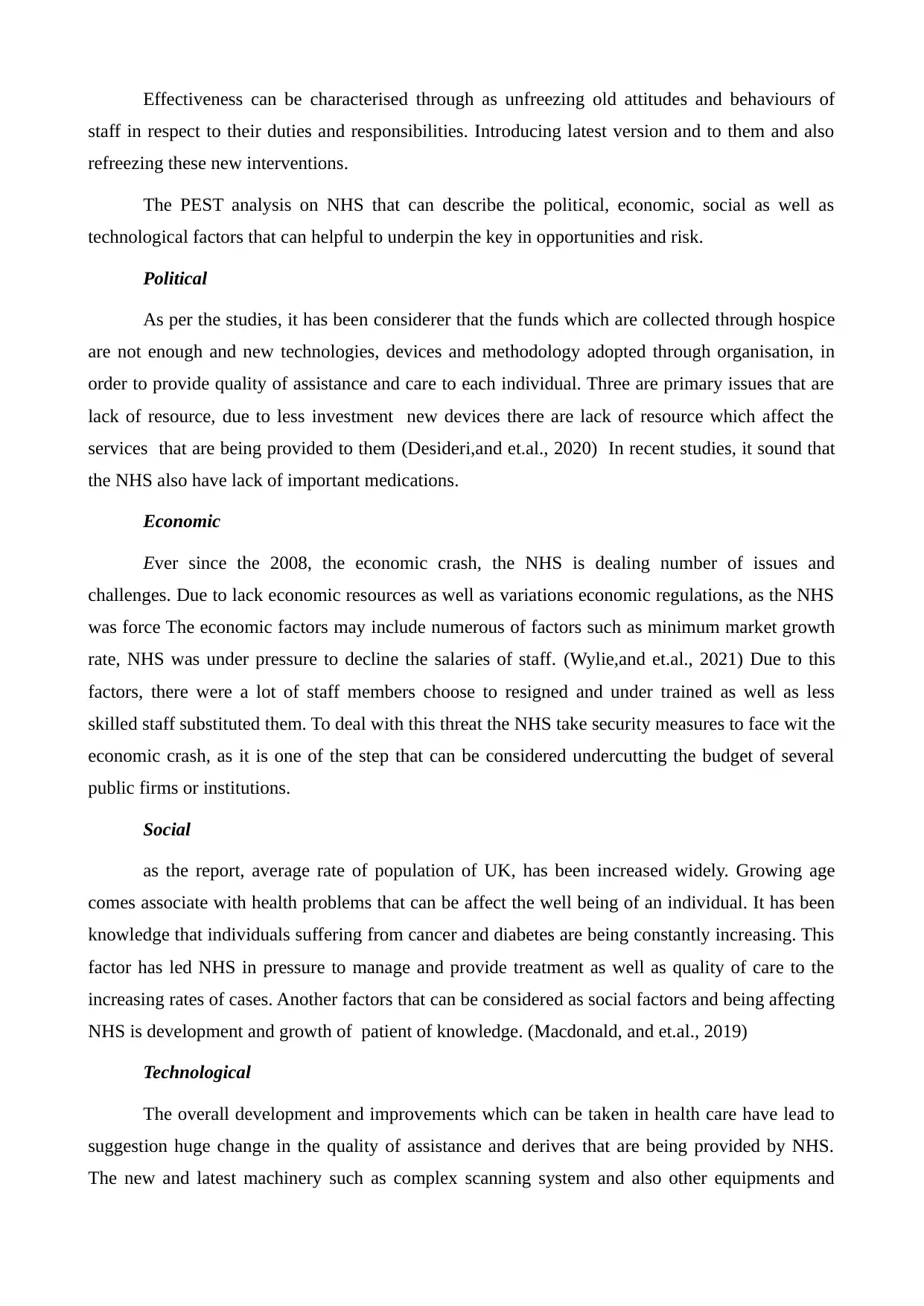
Effectiveness can be characterised through as unfreezing old attitudes and behaviours of
staff in respect to their duties and responsibilities. Introducing latest version and to them and also
refreezing these new interventions.
The PEST analysis on NHS that can describe the political, economic, social as well as
technological factors that can helpful to underpin the key in opportunities and risk.
Political
As per the studies, it has been considerer that the funds which are collected through hospice
are not enough and new technologies, devices and methodology adopted through organisation, in
order to provide quality of assistance and care to each individual. Three are primary issues that are
lack of resource, due to less investment new devices there are lack of resource which affect the
services that are being provided to them (Desideri,and et.al., 2020) In recent studies, it sound that
the NHS also have lack of important medications.
Economic
Ever since the 2008, the economic crash, the NHS is dealing number of issues and
challenges. Due to lack economic resources as well as variations economic regulations, as the NHS
was force The economic factors may include numerous of factors such as minimum market growth
rate, NHS was under pressure to decline the salaries of staff. (Wylie,and et.al., 2021) Due to this
factors, there were a lot of staff members choose to resigned and under trained as well as less
skilled staff substituted them. To deal with this threat the NHS take security measures to face wit the
economic crash, as it is one of the step that can be considered undercutting the budget of several
public firms or institutions.
Social
as the report, average rate of population of UK, has been increased widely. Growing age
comes associate with health problems that can be affect the well being of an individual. It has been
knowledge that individuals suffering from cancer and diabetes are being constantly increasing. This
factor has led NHS in pressure to manage and provide treatment as well as quality of care to the
increasing rates of cases. Another factors that can be considered as social factors and being affecting
NHS is development and growth of patient of knowledge. (Macdonald, and et.al., 2019)
Technological
The overall development and improvements which can be taken in health care have lead to
suggestion huge change in the quality of assistance and derives that are being provided by NHS.
The new and latest machinery such as complex scanning system and also other equipments and
staff in respect to their duties and responsibilities. Introducing latest version and to them and also
refreezing these new interventions.
The PEST analysis on NHS that can describe the political, economic, social as well as
technological factors that can helpful to underpin the key in opportunities and risk.
Political
As per the studies, it has been considerer that the funds which are collected through hospice
are not enough and new technologies, devices and methodology adopted through organisation, in
order to provide quality of assistance and care to each individual. Three are primary issues that are
lack of resource, due to less investment new devices there are lack of resource which affect the
services that are being provided to them (Desideri,and et.al., 2020) In recent studies, it sound that
the NHS also have lack of important medications.
Economic
Ever since the 2008, the economic crash, the NHS is dealing number of issues and
challenges. Due to lack economic resources as well as variations economic regulations, as the NHS
was force The economic factors may include numerous of factors such as minimum market growth
rate, NHS was under pressure to decline the salaries of staff. (Wylie,and et.al., 2021) Due to this
factors, there were a lot of staff members choose to resigned and under trained as well as less
skilled staff substituted them. To deal with this threat the NHS take security measures to face wit the
economic crash, as it is one of the step that can be considered undercutting the budget of several
public firms or institutions.
Social
as the report, average rate of population of UK, has been increased widely. Growing age
comes associate with health problems that can be affect the well being of an individual. It has been
knowledge that individuals suffering from cancer and diabetes are being constantly increasing. This
factor has led NHS in pressure to manage and provide treatment as well as quality of care to the
increasing rates of cases. Another factors that can be considered as social factors and being affecting
NHS is development and growth of patient of knowledge. (Macdonald, and et.al., 2019)
Technological
The overall development and improvements which can be taken in health care have lead to
suggestion huge change in the quality of assistance and derives that are being provided by NHS.
The new and latest machinery such as complex scanning system and also other equipments and
Secure Best Marks with AI Grader
Need help grading? Try our AI Grader for instant feedback on your assignments.
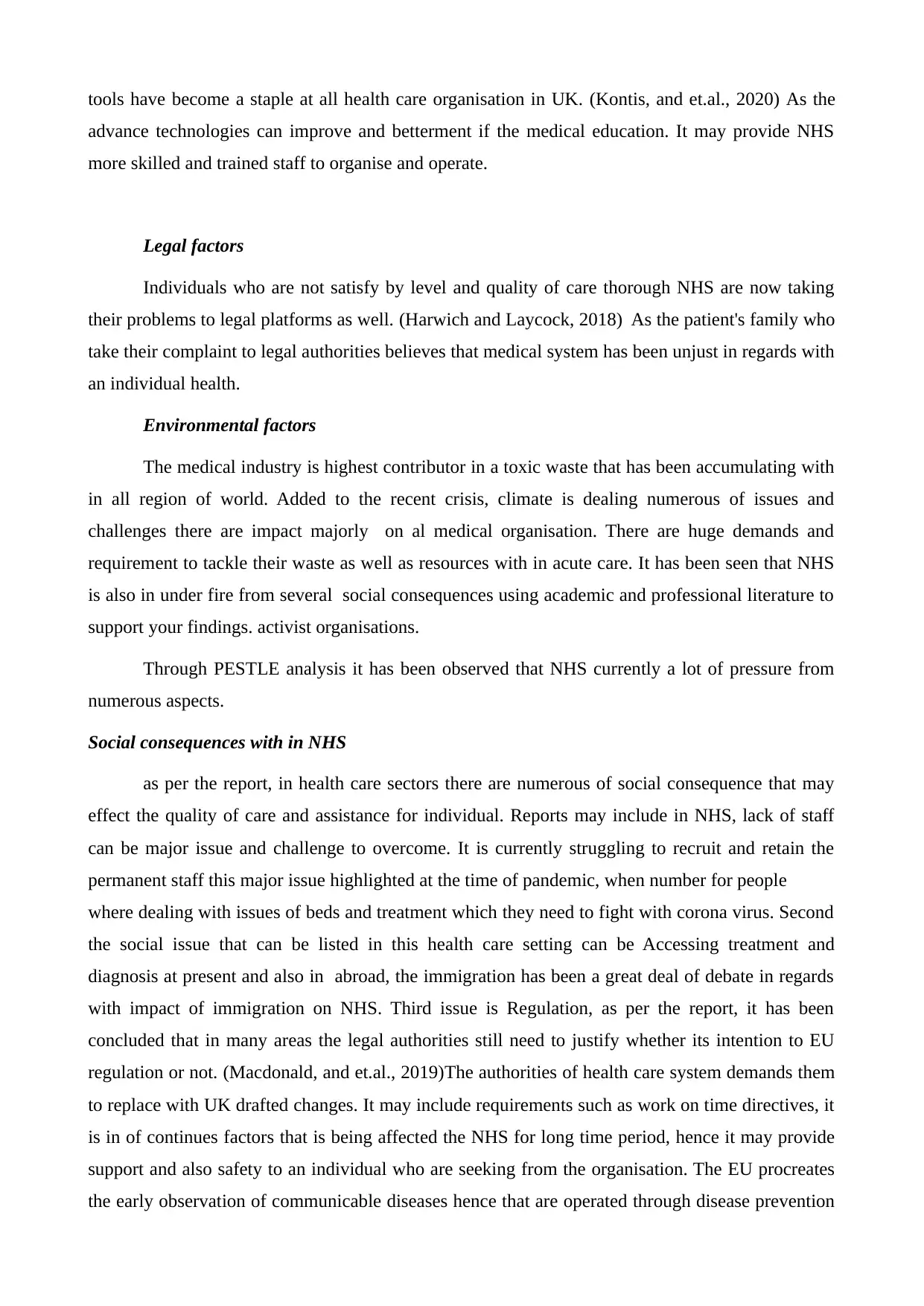
tools have become a staple at all health care organisation in UK. (Kontis, and et.al., 2020) As the
advance technologies can improve and betterment if the medical education. It may provide NHS
more skilled and trained staff to organise and operate.
Legal factors
Individuals who are not satisfy by level and quality of care thorough NHS are now taking
their problems to legal platforms as well. (Harwich and Laycock, 2018) As the patient's family who
take their complaint to legal authorities believes that medical system has been unjust in regards with
an individual health.
Environmental factors
The medical industry is highest contributor in a toxic waste that has been accumulating with
in all region of world. Added to the recent crisis, climate is dealing numerous of issues and
challenges there are impact majorly on al medical organisation. There are huge demands and
requirement to tackle their waste as well as resources with in acute care. It has been seen that NHS
is also in under fire from several social consequences using academic and professional literature to
support your findings. activist organisations.
Through PESTLE analysis it has been observed that NHS currently a lot of pressure from
numerous aspects.
Social consequences with in NHS
as per the report, in health care sectors there are numerous of social consequence that may
effect the quality of care and assistance for individual. Reports may include in NHS, lack of staff
can be major issue and challenge to overcome. It is currently struggling to recruit and retain the
permanent staff this major issue highlighted at the time of pandemic, when number for people
where dealing with issues of beds and treatment which they need to fight with corona virus. Second
the social issue that can be listed in this health care setting can be Accessing treatment and
diagnosis at present and also in abroad, the immigration has been a great deal of debate in regards
with impact of immigration on NHS. Third issue is Regulation, as per the report, it has been
concluded that in many areas the legal authorities still need to justify whether its intention to EU
regulation or not. (Macdonald, and et.al., 2019)The authorities of health care system demands them
to replace with UK drafted changes. It may include requirements such as work on time directives, it
is in of continues factors that is being affected the NHS for long time period, hence it may provide
support and also safety to an individual who are seeking from the organisation. The EU procreates
the early observation of communicable diseases hence that are operated through disease prevention
advance technologies can improve and betterment if the medical education. It may provide NHS
more skilled and trained staff to organise and operate.
Legal factors
Individuals who are not satisfy by level and quality of care thorough NHS are now taking
their problems to legal platforms as well. (Harwich and Laycock, 2018) As the patient's family who
take their complaint to legal authorities believes that medical system has been unjust in regards with
an individual health.
Environmental factors
The medical industry is highest contributor in a toxic waste that has been accumulating with
in all region of world. Added to the recent crisis, climate is dealing numerous of issues and
challenges there are impact majorly on al medical organisation. There are huge demands and
requirement to tackle their waste as well as resources with in acute care. It has been seen that NHS
is also in under fire from several social consequences using academic and professional literature to
support your findings. activist organisations.
Through PESTLE analysis it has been observed that NHS currently a lot of pressure from
numerous aspects.
Social consequences with in NHS
as per the report, in health care sectors there are numerous of social consequence that may
effect the quality of care and assistance for individual. Reports may include in NHS, lack of staff
can be major issue and challenge to overcome. It is currently struggling to recruit and retain the
permanent staff this major issue highlighted at the time of pandemic, when number for people
where dealing with issues of beds and treatment which they need to fight with corona virus. Second
the social issue that can be listed in this health care setting can be Accessing treatment and
diagnosis at present and also in abroad, the immigration has been a great deal of debate in regards
with impact of immigration on NHS. Third issue is Regulation, as per the report, it has been
concluded that in many areas the legal authorities still need to justify whether its intention to EU
regulation or not. (Macdonald, and et.al., 2019)The authorities of health care system demands them
to replace with UK drafted changes. It may include requirements such as work on time directives, it
is in of continues factors that is being affected the NHS for long time period, hence it may provide
support and also safety to an individual who are seeking from the organisation. The EU procreates
the early observation of communicable diseases hence that are operated through disease prevention
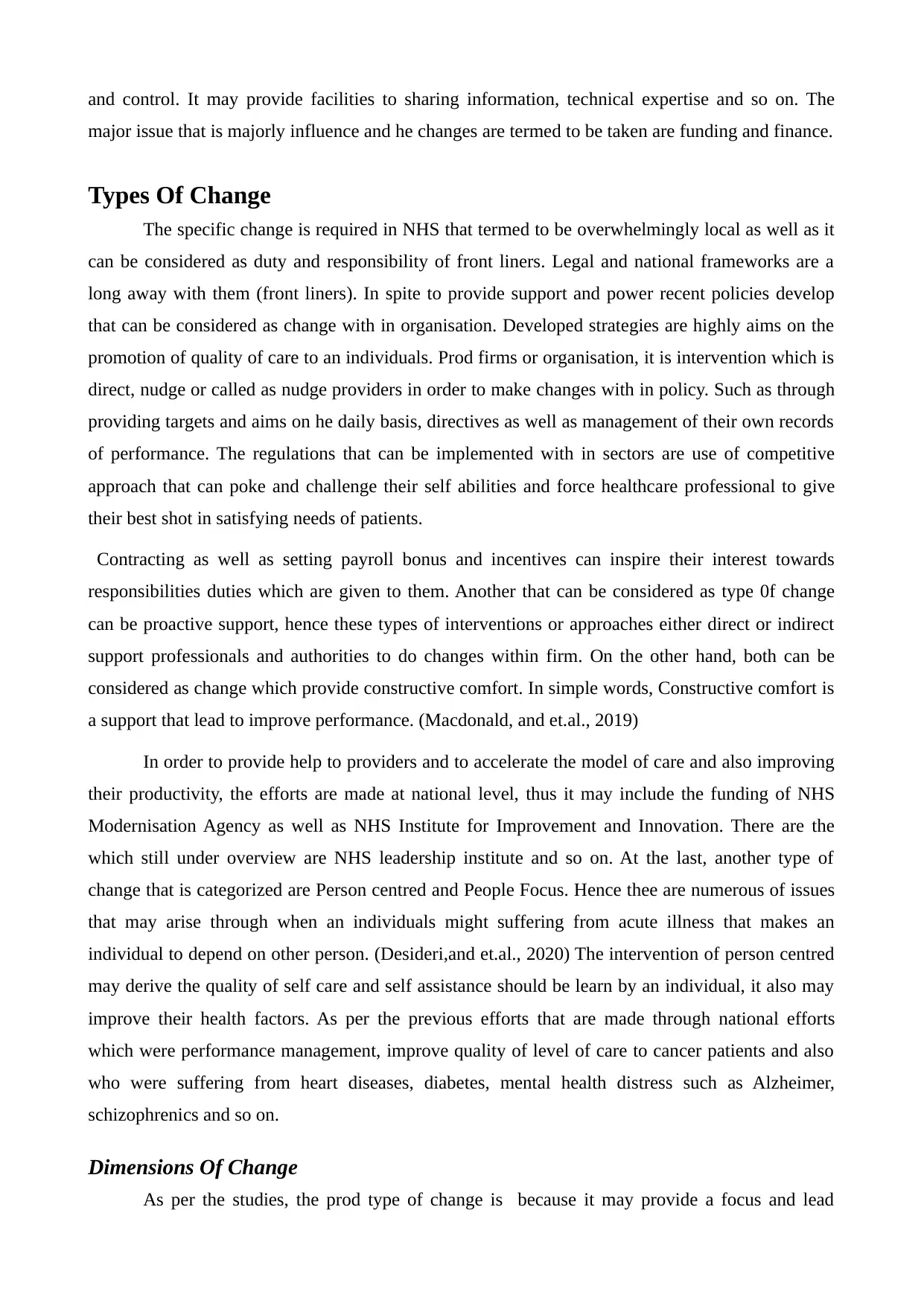
and control. It may provide facilities to sharing information, technical expertise and so on. The
major issue that is majorly influence and he changes are termed to be taken are funding and finance.
Types Of Change
The specific change is required in NHS that termed to be overwhelmingly local as well as it
can be considered as duty and responsibility of front liners. Legal and national frameworks are a
long away with them (front liners). In spite to provide support and power recent policies develop
that can be considered as change with in organisation. Developed strategies are highly aims on the
promotion of quality of care to an individuals. Prod firms or organisation, it is intervention which is
direct, nudge or called as nudge providers in order to make changes with in policy. Such as through
providing targets and aims on he daily basis, directives as well as management of their own records
of performance. The regulations that can be implemented with in sectors are use of competitive
approach that can poke and challenge their self abilities and force healthcare professional to give
their best shot in satisfying needs of patients.
Contracting as well as setting payroll bonus and incentives can inspire their interest towards
responsibilities duties which are given to them. Another that can be considered as type 0f change
can be proactive support, hence these types of interventions or approaches either direct or indirect
support professionals and authorities to do changes within firm. On the other hand, both can be
considered as change which provide constructive comfort. In simple words, Constructive comfort is
a support that lead to improve performance. (Macdonald, and et.al., 2019)
In order to provide help to providers and to accelerate the model of care and also improving
their productivity, the efforts are made at national level, thus it may include the funding of NHS
Modernisation Agency as well as NHS Institute for Improvement and Innovation. There are the
which still under overview are NHS leadership institute and so on. At the last, another type of
change that is categorized are Person centred and People Focus. Hence thee are numerous of issues
that may arise through when an individuals might suffering from acute illness that makes an
individual to depend on other person. (Desideri,and et.al., 2020) The intervention of person centred
may derive the quality of self care and self assistance should be learn by an individual, it also may
improve their health factors. As per the previous efforts that are made through national efforts
which were performance management, improve quality of level of care to cancer patients and also
who were suffering from heart diseases, diabetes, mental health distress such as Alzheimer,
schizophrenics and so on.
Dimensions Of Change
As per the studies, the prod type of change is because it may provide a focus and lead
major issue that is majorly influence and he changes are termed to be taken are funding and finance.
Types Of Change
The specific change is required in NHS that termed to be overwhelmingly local as well as it
can be considered as duty and responsibility of front liners. Legal and national frameworks are a
long away with them (front liners). In spite to provide support and power recent policies develop
that can be considered as change with in organisation. Developed strategies are highly aims on the
promotion of quality of care to an individuals. Prod firms or organisation, it is intervention which is
direct, nudge or called as nudge providers in order to make changes with in policy. Such as through
providing targets and aims on he daily basis, directives as well as management of their own records
of performance. The regulations that can be implemented with in sectors are use of competitive
approach that can poke and challenge their self abilities and force healthcare professional to give
their best shot in satisfying needs of patients.
Contracting as well as setting payroll bonus and incentives can inspire their interest towards
responsibilities duties which are given to them. Another that can be considered as type 0f change
can be proactive support, hence these types of interventions or approaches either direct or indirect
support professionals and authorities to do changes within firm. On the other hand, both can be
considered as change which provide constructive comfort. In simple words, Constructive comfort is
a support that lead to improve performance. (Macdonald, and et.al., 2019)
In order to provide help to providers and to accelerate the model of care and also improving
their productivity, the efforts are made at national level, thus it may include the funding of NHS
Modernisation Agency as well as NHS Institute for Improvement and Innovation. There are the
which still under overview are NHS leadership institute and so on. At the last, another type of
change that is categorized are Person centred and People Focus. Hence thee are numerous of issues
that may arise through when an individuals might suffering from acute illness that makes an
individual to depend on other person. (Desideri,and et.al., 2020) The intervention of person centred
may derive the quality of self care and self assistance should be learn by an individual, it also may
improve their health factors. As per the previous efforts that are made through national efforts
which were performance management, improve quality of level of care to cancer patients and also
who were suffering from heart diseases, diabetes, mental health distress such as Alzheimer,
schizophrenics and so on.
Dimensions Of Change
As per the studies, the prod type of change is because it may provide a focus and lead
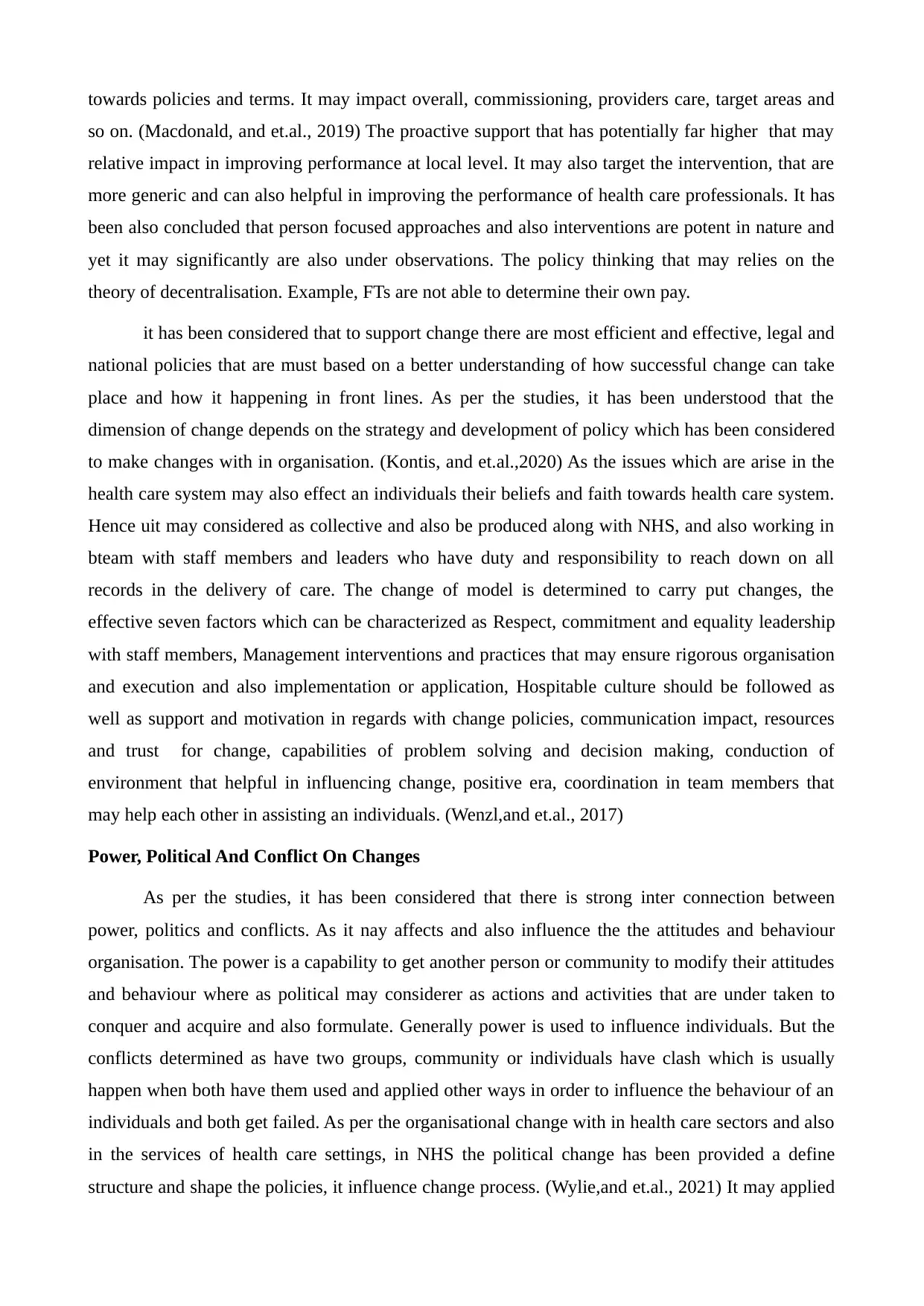
towards policies and terms. It may impact overall, commissioning, providers care, target areas and
so on. (Macdonald, and et.al., 2019) The proactive support that has potentially far higher that may
relative impact in improving performance at local level. It may also target the intervention, that are
more generic and can also helpful in improving the performance of health care professionals. It has
been also concluded that person focused approaches and also interventions are potent in nature and
yet it may significantly are also under observations. The policy thinking that may relies on the
theory of decentralisation. Example, FTs are not able to determine their own pay.
it has been considered that to support change there are most efficient and effective, legal and
national policies that are must based on a better understanding of how successful change can take
place and how it happening in front lines. As per the studies, it has been understood that the
dimension of change depends on the strategy and development of policy which has been considered
to make changes with in organisation. (Kontis, and et.al.,2020) As the issues which are arise in the
health care system may also effect an individuals their beliefs and faith towards health care system.
Hence uit may considered as collective and also be produced along with NHS, and also working in
bteam with staff members and leaders who have duty and responsibility to reach down on all
records in the delivery of care. The change of model is determined to carry put changes, the
effective seven factors which can be characterized as Respect, commitment and equality leadership
with staff members, Management interventions and practices that may ensure rigorous organisation
and execution and also implementation or application, Hospitable culture should be followed as
well as support and motivation in regards with change policies, communication impact, resources
and trust for change, capabilities of problem solving and decision making, conduction of
environment that helpful in influencing change, positive era, coordination in team members that
may help each other in assisting an individuals. (Wenzl,and et.al., 2017)
Power, Political And Conflict On Changes
As per the studies, it has been considered that there is strong inter connection between
power, politics and conflicts. As it nay affects and also influence the the attitudes and behaviour
organisation. The power is a capability to get another person or community to modify their attitudes
and behaviour where as political may considerer as actions and activities that are under taken to
conquer and acquire and also formulate. Generally power is used to influence individuals. But the
conflicts determined as have two groups, community or individuals have clash which is usually
happen when both have them used and applied other ways in order to influence the behaviour of an
individuals and both get failed. As per the organisational change with in health care sectors and also
in the services of health care settings, in NHS the political change has been provided a define
structure and shape the policies, it influence change process. (Wylie,and et.al., 2021) It may applied
so on. (Macdonald, and et.al., 2019) The proactive support that has potentially far higher that may
relative impact in improving performance at local level. It may also target the intervention, that are
more generic and can also helpful in improving the performance of health care professionals. It has
been also concluded that person focused approaches and also interventions are potent in nature and
yet it may significantly are also under observations. The policy thinking that may relies on the
theory of decentralisation. Example, FTs are not able to determine their own pay.
it has been considered that to support change there are most efficient and effective, legal and
national policies that are must based on a better understanding of how successful change can take
place and how it happening in front lines. As per the studies, it has been understood that the
dimension of change depends on the strategy and development of policy which has been considered
to make changes with in organisation. (Kontis, and et.al.,2020) As the issues which are arise in the
health care system may also effect an individuals their beliefs and faith towards health care system.
Hence uit may considered as collective and also be produced along with NHS, and also working in
bteam with staff members and leaders who have duty and responsibility to reach down on all
records in the delivery of care. The change of model is determined to carry put changes, the
effective seven factors which can be characterized as Respect, commitment and equality leadership
with staff members, Management interventions and practices that may ensure rigorous organisation
and execution and also implementation or application, Hospitable culture should be followed as
well as support and motivation in regards with change policies, communication impact, resources
and trust for change, capabilities of problem solving and decision making, conduction of
environment that helpful in influencing change, positive era, coordination in team members that
may help each other in assisting an individuals. (Wenzl,and et.al., 2017)
Power, Political And Conflict On Changes
As per the studies, it has been considered that there is strong inter connection between
power, politics and conflicts. As it nay affects and also influence the the attitudes and behaviour
organisation. The power is a capability to get another person or community to modify their attitudes
and behaviour where as political may considerer as actions and activities that are under taken to
conquer and acquire and also formulate. Generally power is used to influence individuals. But the
conflicts determined as have two groups, community or individuals have clash which is usually
happen when both have them used and applied other ways in order to influence the behaviour of an
individuals and both get failed. As per the organisational change with in health care sectors and also
in the services of health care settings, in NHS the political change has been provided a define
structure and shape the policies, it influence change process. (Wylie,and et.al., 2021) It may applied
Paraphrase This Document
Need a fresh take? Get an instant paraphrase of this document with our AI Paraphraser
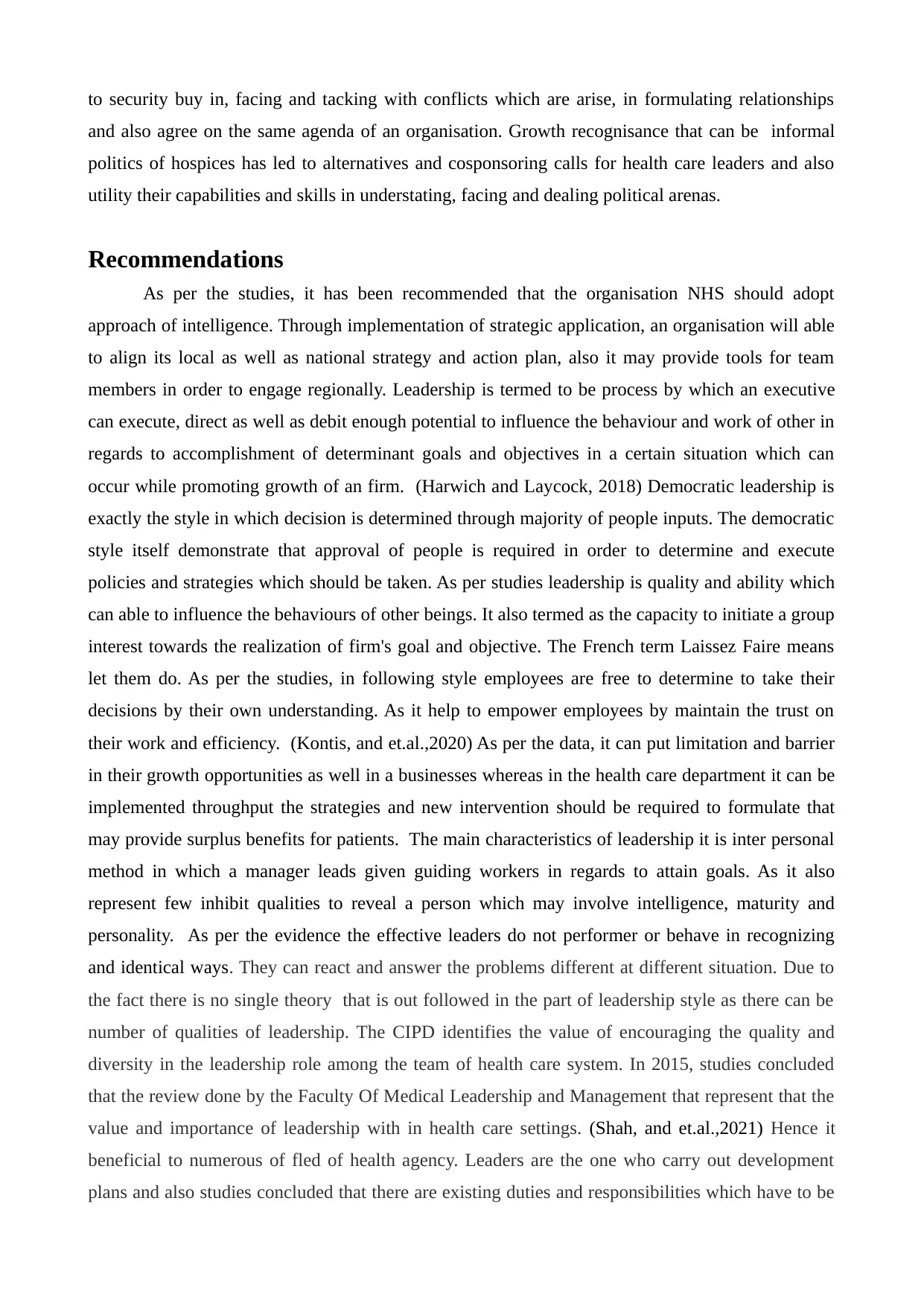
to security buy in, facing and tacking with conflicts which are arise, in formulating relationships
and also agree on the same agenda of an organisation. Growth recognisance that can be informal
politics of hospices has led to alternatives and cosponsoring calls for health care leaders and also
utility their capabilities and skills in understating, facing and dealing political arenas.
Recommendations
As per the studies, it has been recommended that the organisation NHS should adopt
approach of intelligence. Through implementation of strategic application, an organisation will able
to align its local as well as national strategy and action plan, also it may provide tools for team
members in order to engage regionally. Leadership is termed to be process by which an executive
can execute, direct as well as debit enough potential to influence the behaviour and work of other in
regards to accomplishment of determinant goals and objectives in a certain situation which can
occur while promoting growth of an firm. (Harwich and Laycock, 2018) Democratic leadership is
exactly the style in which decision is determined through majority of people inputs. The democratic
style itself demonstrate that approval of people is required in order to determine and execute
policies and strategies which should be taken. As per studies leadership is quality and ability which
can able to influence the behaviours of other beings. It also termed as the capacity to initiate a group
interest towards the realization of firm's goal and objective. The French term Laissez Faire means
let them do. As per the studies, in following style employees are free to determine to take their
decisions by their own understanding. As it help to empower employees by maintain the trust on
their work and efficiency. (Kontis, and et.al.,2020) As per the data, it can put limitation and barrier
in their growth opportunities as well in a businesses whereas in the health care department it can be
implemented throughput the strategies and new intervention should be required to formulate that
may provide surplus benefits for patients. The main characteristics of leadership it is inter personal
method in which a manager leads given guiding workers in regards to attain goals. As it also
represent few inhibit qualities to reveal a person which may involve intelligence, maturity and
personality. As per the evidence the effective leaders do not performer or behave in recognizing
and identical ways. They can react and answer the problems different at different situation. Due to
the fact there is no single theory that is out followed in the part of leadership style as there can be
number of qualities of leadership. The CIPD identifies the value of encouraging the quality and
diversity in the leadership role among the team of health care system. In 2015, studies concluded
that the review done by the Faculty Of Medical Leadership and Management that represent that the
value and importance of leadership with in health care settings. (Shah, and et.al.,2021) Hence it
beneficial to numerous of fled of health agency. Leaders are the one who carry out development
plans and also studies concluded that there are existing duties and responsibilities which have to be
and also agree on the same agenda of an organisation. Growth recognisance that can be informal
politics of hospices has led to alternatives and cosponsoring calls for health care leaders and also
utility their capabilities and skills in understating, facing and dealing political arenas.
Recommendations
As per the studies, it has been recommended that the organisation NHS should adopt
approach of intelligence. Through implementation of strategic application, an organisation will able
to align its local as well as national strategy and action plan, also it may provide tools for team
members in order to engage regionally. Leadership is termed to be process by which an executive
can execute, direct as well as debit enough potential to influence the behaviour and work of other in
regards to accomplishment of determinant goals and objectives in a certain situation which can
occur while promoting growth of an firm. (Harwich and Laycock, 2018) Democratic leadership is
exactly the style in which decision is determined through majority of people inputs. The democratic
style itself demonstrate that approval of people is required in order to determine and execute
policies and strategies which should be taken. As per studies leadership is quality and ability which
can able to influence the behaviours of other beings. It also termed as the capacity to initiate a group
interest towards the realization of firm's goal and objective. The French term Laissez Faire means
let them do. As per the studies, in following style employees are free to determine to take their
decisions by their own understanding. As it help to empower employees by maintain the trust on
their work and efficiency. (Kontis, and et.al.,2020) As per the data, it can put limitation and barrier
in their growth opportunities as well in a businesses whereas in the health care department it can be
implemented throughput the strategies and new intervention should be required to formulate that
may provide surplus benefits for patients. The main characteristics of leadership it is inter personal
method in which a manager leads given guiding workers in regards to attain goals. As it also
represent few inhibit qualities to reveal a person which may involve intelligence, maturity and
personality. As per the evidence the effective leaders do not performer or behave in recognizing
and identical ways. They can react and answer the problems different at different situation. Due to
the fact there is no single theory that is out followed in the part of leadership style as there can be
number of qualities of leadership. The CIPD identifies the value of encouraging the quality and
diversity in the leadership role among the team of health care system. In 2015, studies concluded
that the review done by the Faculty Of Medical Leadership and Management that represent that the
value and importance of leadership with in health care settings. (Shah, and et.al.,2021) Hence it
beneficial to numerous of fled of health agency. Leaders are the one who carry out development
plans and also studies concluded that there are existing duties and responsibilities which have to be
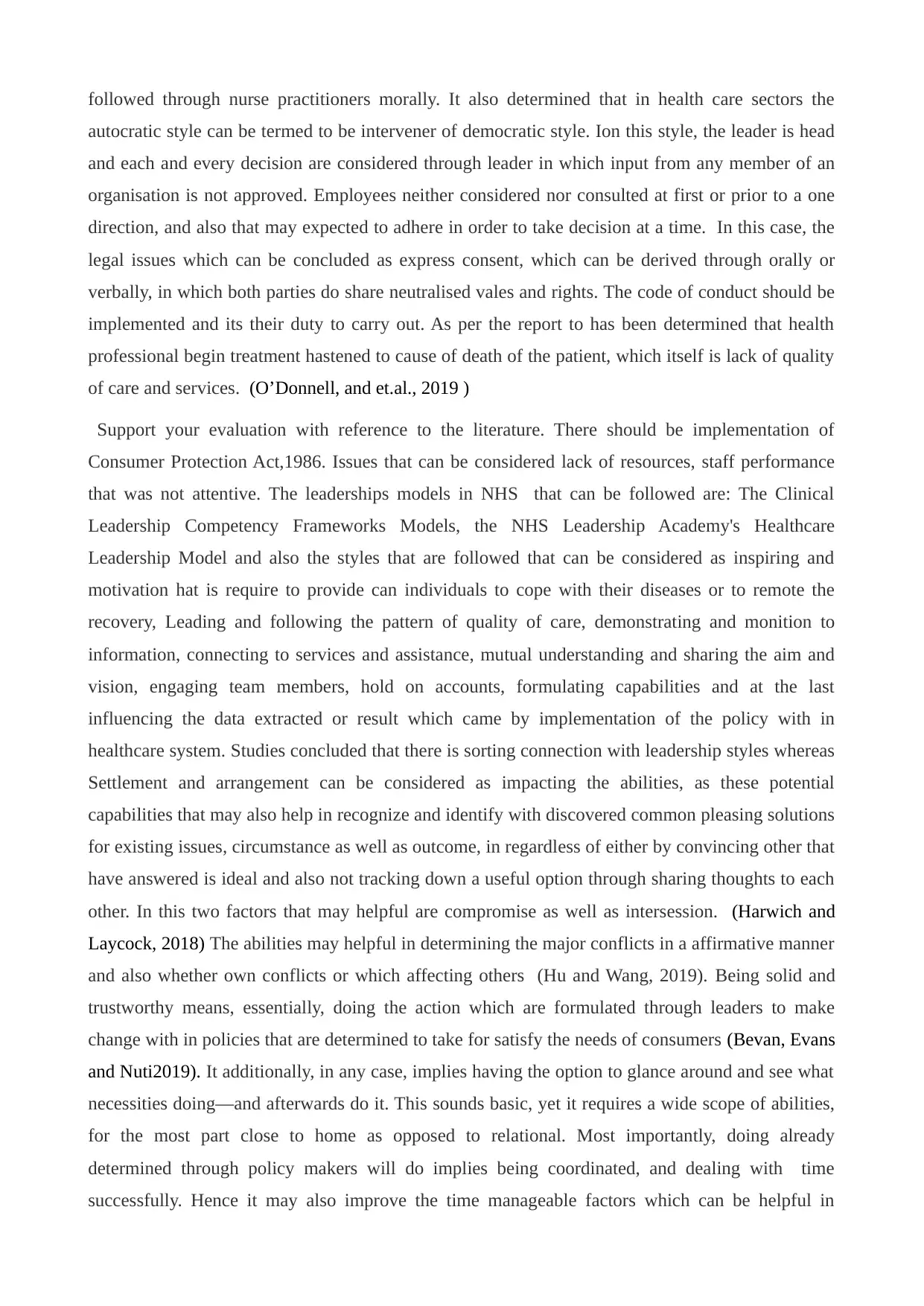
followed through nurse practitioners morally. It also determined that in health care sectors the
autocratic style can be termed to be intervener of democratic style. Ion this style, the leader is head
and each and every decision are considered through leader in which input from any member of an
organisation is not approved. Employees neither considered nor consulted at first or prior to a one
direction, and also that may expected to adhere in order to take decision at a time. In this case, the
legal issues which can be concluded as express consent, which can be derived through orally or
verbally, in which both parties do share neutralised vales and rights. The code of conduct should be
implemented and its their duty to carry out. As per the report to has been determined that health
professional begin treatment hastened to cause of death of the patient, which itself is lack of quality
of care and services. (O’Donnell, and et.al., 2019 )
Support your evaluation with reference to the literature. There should be implementation of
Consumer Protection Act,1986. Issues that can be considered lack of resources, staff performance
that was not attentive. The leaderships models in NHS that can be followed are: The Clinical
Leadership Competency Frameworks Models, the NHS Leadership Academy's Healthcare
Leadership Model and also the styles that are followed that can be considered as inspiring and
motivation hat is require to provide can individuals to cope with their diseases or to remote the
recovery, Leading and following the pattern of quality of care, demonstrating and monition to
information, connecting to services and assistance, mutual understanding and sharing the aim and
vision, engaging team members, hold on accounts, formulating capabilities and at the last
influencing the data extracted or result which came by implementation of the policy with in
healthcare system. Studies concluded that there is sorting connection with leadership styles whereas
Settlement and arrangement can be considered as impacting the abilities, as these potential
capabilities that may also help in recognize and identify with discovered common pleasing solutions
for existing issues, circumstance as well as outcome, in regardless of either by convincing other that
have answered is ideal and also not tracking down a useful option through sharing thoughts to each
other. In this two factors that may helpful are compromise as well as intersession. (Harwich and
Laycock, 2018) The abilities may helpful in determining the major conflicts in a affirmative manner
and also whether own conflicts or which affecting others (Hu and Wang, 2019). Being solid and
trustworthy means, essentially, doing the action which are formulated through leaders to make
change with in policies that are determined to take for satisfy the needs of consumers (Bevan, Evans
and Nuti2019). It additionally, in any case, implies having the option to glance around and see what
necessities doing—and afterwards do it. This sounds basic, yet it requires a wide scope of abilities,
for the most part close to home as opposed to relational. Most importantly, doing already
determined through policy makers will do implies being coordinated, and dealing with time
successfully. Hence it may also improve the time manageable factors which can be helpful in
autocratic style can be termed to be intervener of democratic style. Ion this style, the leader is head
and each and every decision are considered through leader in which input from any member of an
organisation is not approved. Employees neither considered nor consulted at first or prior to a one
direction, and also that may expected to adhere in order to take decision at a time. In this case, the
legal issues which can be concluded as express consent, which can be derived through orally or
verbally, in which both parties do share neutralised vales and rights. The code of conduct should be
implemented and its their duty to carry out. As per the report to has been determined that health
professional begin treatment hastened to cause of death of the patient, which itself is lack of quality
of care and services. (O’Donnell, and et.al., 2019 )
Support your evaluation with reference to the literature. There should be implementation of
Consumer Protection Act,1986. Issues that can be considered lack of resources, staff performance
that was not attentive. The leaderships models in NHS that can be followed are: The Clinical
Leadership Competency Frameworks Models, the NHS Leadership Academy's Healthcare
Leadership Model and also the styles that are followed that can be considered as inspiring and
motivation hat is require to provide can individuals to cope with their diseases or to remote the
recovery, Leading and following the pattern of quality of care, demonstrating and monition to
information, connecting to services and assistance, mutual understanding and sharing the aim and
vision, engaging team members, hold on accounts, formulating capabilities and at the last
influencing the data extracted or result which came by implementation of the policy with in
healthcare system. Studies concluded that there is sorting connection with leadership styles whereas
Settlement and arrangement can be considered as impacting the abilities, as these potential
capabilities that may also help in recognize and identify with discovered common pleasing solutions
for existing issues, circumstance as well as outcome, in regardless of either by convincing other that
have answered is ideal and also not tracking down a useful option through sharing thoughts to each
other. In this two factors that may helpful are compromise as well as intersession. (Harwich and
Laycock, 2018) The abilities may helpful in determining the major conflicts in a affirmative manner
and also whether own conflicts or which affecting others (Hu and Wang, 2019). Being solid and
trustworthy means, essentially, doing the action which are formulated through leaders to make
change with in policies that are determined to take for satisfy the needs of consumers (Bevan, Evans
and Nuti2019). It additionally, in any case, implies having the option to glance around and see what
necessities doing—and afterwards do it. This sounds basic, yet it requires a wide scope of abilities,
for the most part close to home as opposed to relational. Most importantly, doing already
determined through policy makers will do implies being coordinated, and dealing with time
successfully. Hence it may also improve the time manageable factors which can be helpful in
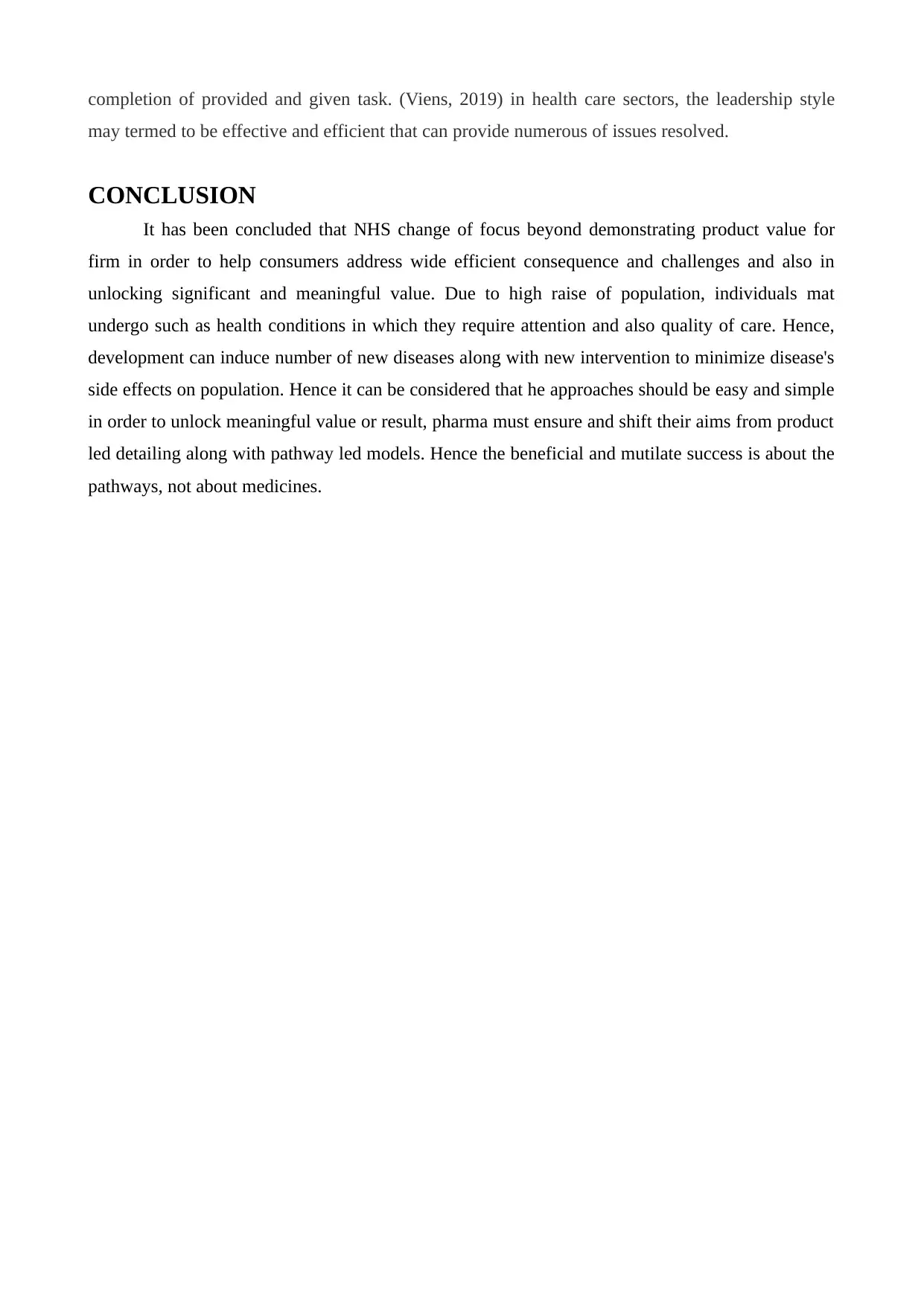
completion of provided and given task. (Viens, 2019) in health care sectors, the leadership style
may termed to be effective and efficient that can provide numerous of issues resolved.
CONCLUSION
It has been concluded that NHS change of focus beyond demonstrating product value for
firm in order to help consumers address wide efficient consequence and challenges and also in
unlocking significant and meaningful value. Due to high raise of population, individuals mat
undergo such as health conditions in which they require attention and also quality of care. Hence,
development can induce number of new diseases along with new intervention to minimize disease's
side effects on population. Hence it can be considered that he approaches should be easy and simple
in order to unlock meaningful value or result, pharma must ensure and shift their aims from product
led detailing along with pathway led models. Hence the beneficial and mutilate success is about the
pathways, not about medicines.
may termed to be effective and efficient that can provide numerous of issues resolved.
CONCLUSION
It has been concluded that NHS change of focus beyond demonstrating product value for
firm in order to help consumers address wide efficient consequence and challenges and also in
unlocking significant and meaningful value. Due to high raise of population, individuals mat
undergo such as health conditions in which they require attention and also quality of care. Hence,
development can induce number of new diseases along with new intervention to minimize disease's
side effects on population. Hence it can be considered that he approaches should be easy and simple
in order to unlock meaningful value or result, pharma must ensure and shift their aims from product
led detailing along with pathway led models. Hence the beneficial and mutilate success is about the
pathways, not about medicines.
Secure Best Marks with AI Grader
Need help grading? Try our AI Grader for instant feedback on your assignments.
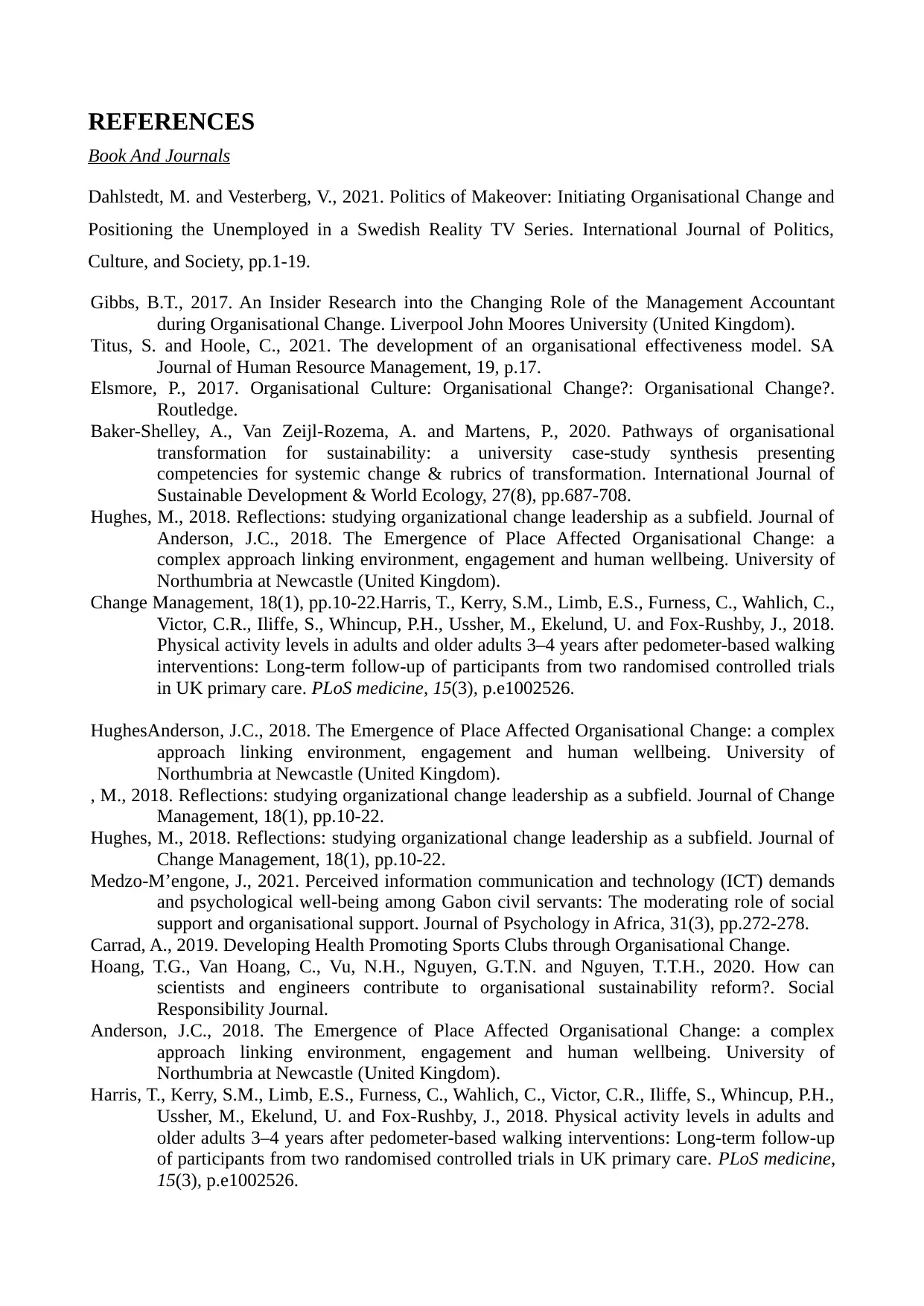
REFERENCES
Book And Journals
Dahlstedt, M. and Vesterberg, V., 2021. Politics of Makeover: Initiating Organisational Change and
Positioning the Unemployed in a Swedish Reality TV Series. International Journal of Politics,
Culture, and Society, pp.1-19.
Gibbs, B.T., 2017. An Insider Research into the Changing Role of the Management Accountant
during Organisational Change. Liverpool John Moores University (United Kingdom).
Titus, S. and Hoole, C., 2021. The development of an organisational effectiveness model. SA
Journal of Human Resource Management, 19, p.17.
Elsmore, P., 2017. Organisational Culture: Organisational Change?: Organisational Change?.
Routledge.
Baker-Shelley, A., Van Zeijl-Rozema, A. and Martens, P., 2020. Pathways of organisational
transformation for sustainability: a university case-study synthesis presenting
competencies for systemic change & rubrics of transformation. International Journal of
Sustainable Development & World Ecology, 27(8), pp.687-708.
Hughes, M., 2018. Reflections: studying organizational change leadership as a subfield. Journal of
Anderson, J.C., 2018. The Emergence of Place Affected Organisational Change: a
complex approach linking environment, engagement and human wellbeing. University of
Northumbria at Newcastle (United Kingdom).
Change Management, 18(1), pp.10-22.Harris, T., Kerry, S.M., Limb, E.S., Furness, C., Wahlich, C.,
Victor, C.R., Iliffe, S., Whincup, P.H., Ussher, M., Ekelund, U. and Fox-Rushby, J., 2018.
Physical activity levels in adults and older adults 3–4 years after pedometer-based walking
interventions: Long-term follow-up of participants from two randomised controlled trials
in UK primary care. PLoS medicine, 15(3), p.e1002526.
HughesAnderson, J.C., 2018. The Emergence of Place Affected Organisational Change: a complex
approach linking environment, engagement and human wellbeing. University of
Northumbria at Newcastle (United Kingdom).
, M., 2018. Reflections: studying organizational change leadership as a subfield. Journal of Change
Management, 18(1), pp.10-22.
Hughes, M., 2018. Reflections: studying organizational change leadership as a subfield. Journal of
Change Management, 18(1), pp.10-22.
Medzo-M’engone, J., 2021. Perceived information communication and technology (ICT) demands
and psychological well-being among Gabon civil servants: The moderating role of social
support and organisational support. Journal of Psychology in Africa, 31(3), pp.272-278.
Carrad, A., 2019. Developing Health Promoting Sports Clubs through Organisational Change.
Hoang, T.G., Van Hoang, C., Vu, N.H., Nguyen, G.T.N. and Nguyen, T.T.H., 2020. How can
scientists and engineers contribute to organisational sustainability reform?. Social
Responsibility Journal.
Anderson, J.C., 2018. The Emergence of Place Affected Organisational Change: a complex
approach linking environment, engagement and human wellbeing. University of
Northumbria at Newcastle (United Kingdom).
Harris, T., Kerry, S.M., Limb, E.S., Furness, C., Wahlich, C., Victor, C.R., Iliffe, S., Whincup, P.H.,
Ussher, M., Ekelund, U. and Fox-Rushby, J., 2018. Physical activity levels in adults and
older adults 3–4 years after pedometer-based walking interventions: Long-term follow-up
of participants from two randomised controlled trials in UK primary care. PLoS medicine,
15(3), p.e1002526.
Book And Journals
Dahlstedt, M. and Vesterberg, V., 2021. Politics of Makeover: Initiating Organisational Change and
Positioning the Unemployed in a Swedish Reality TV Series. International Journal of Politics,
Culture, and Society, pp.1-19.
Gibbs, B.T., 2017. An Insider Research into the Changing Role of the Management Accountant
during Organisational Change. Liverpool John Moores University (United Kingdom).
Titus, S. and Hoole, C., 2021. The development of an organisational effectiveness model. SA
Journal of Human Resource Management, 19, p.17.
Elsmore, P., 2017. Organisational Culture: Organisational Change?: Organisational Change?.
Routledge.
Baker-Shelley, A., Van Zeijl-Rozema, A. and Martens, P., 2020. Pathways of organisational
transformation for sustainability: a university case-study synthesis presenting
competencies for systemic change & rubrics of transformation. International Journal of
Sustainable Development & World Ecology, 27(8), pp.687-708.
Hughes, M., 2018. Reflections: studying organizational change leadership as a subfield. Journal of
Anderson, J.C., 2018. The Emergence of Place Affected Organisational Change: a
complex approach linking environment, engagement and human wellbeing. University of
Northumbria at Newcastle (United Kingdom).
Change Management, 18(1), pp.10-22.Harris, T., Kerry, S.M., Limb, E.S., Furness, C., Wahlich, C.,
Victor, C.R., Iliffe, S., Whincup, P.H., Ussher, M., Ekelund, U. and Fox-Rushby, J., 2018.
Physical activity levels in adults and older adults 3–4 years after pedometer-based walking
interventions: Long-term follow-up of participants from two randomised controlled trials
in UK primary care. PLoS medicine, 15(3), p.e1002526.
HughesAnderson, J.C., 2018. The Emergence of Place Affected Organisational Change: a complex
approach linking environment, engagement and human wellbeing. University of
Northumbria at Newcastle (United Kingdom).
, M., 2018. Reflections: studying organizational change leadership as a subfield. Journal of Change
Management, 18(1), pp.10-22.
Hughes, M., 2018. Reflections: studying organizational change leadership as a subfield. Journal of
Change Management, 18(1), pp.10-22.
Medzo-M’engone, J., 2021. Perceived information communication and technology (ICT) demands
and psychological well-being among Gabon civil servants: The moderating role of social
support and organisational support. Journal of Psychology in Africa, 31(3), pp.272-278.
Carrad, A., 2019. Developing Health Promoting Sports Clubs through Organisational Change.
Hoang, T.G., Van Hoang, C., Vu, N.H., Nguyen, G.T.N. and Nguyen, T.T.H., 2020. How can
scientists and engineers contribute to organisational sustainability reform?. Social
Responsibility Journal.
Anderson, J.C., 2018. The Emergence of Place Affected Organisational Change: a complex
approach linking environment, engagement and human wellbeing. University of
Northumbria at Newcastle (United Kingdom).
Harris, T., Kerry, S.M., Limb, E.S., Furness, C., Wahlich, C., Victor, C.R., Iliffe, S., Whincup, P.H.,
Ussher, M., Ekelund, U. and Fox-Rushby, J., 2018. Physical activity levels in adults and
older adults 3–4 years after pedometer-based walking interventions: Long-term follow-up
of participants from two randomised controlled trials in UK primary care. PLoS medicine,
15(3), p.e1002526.
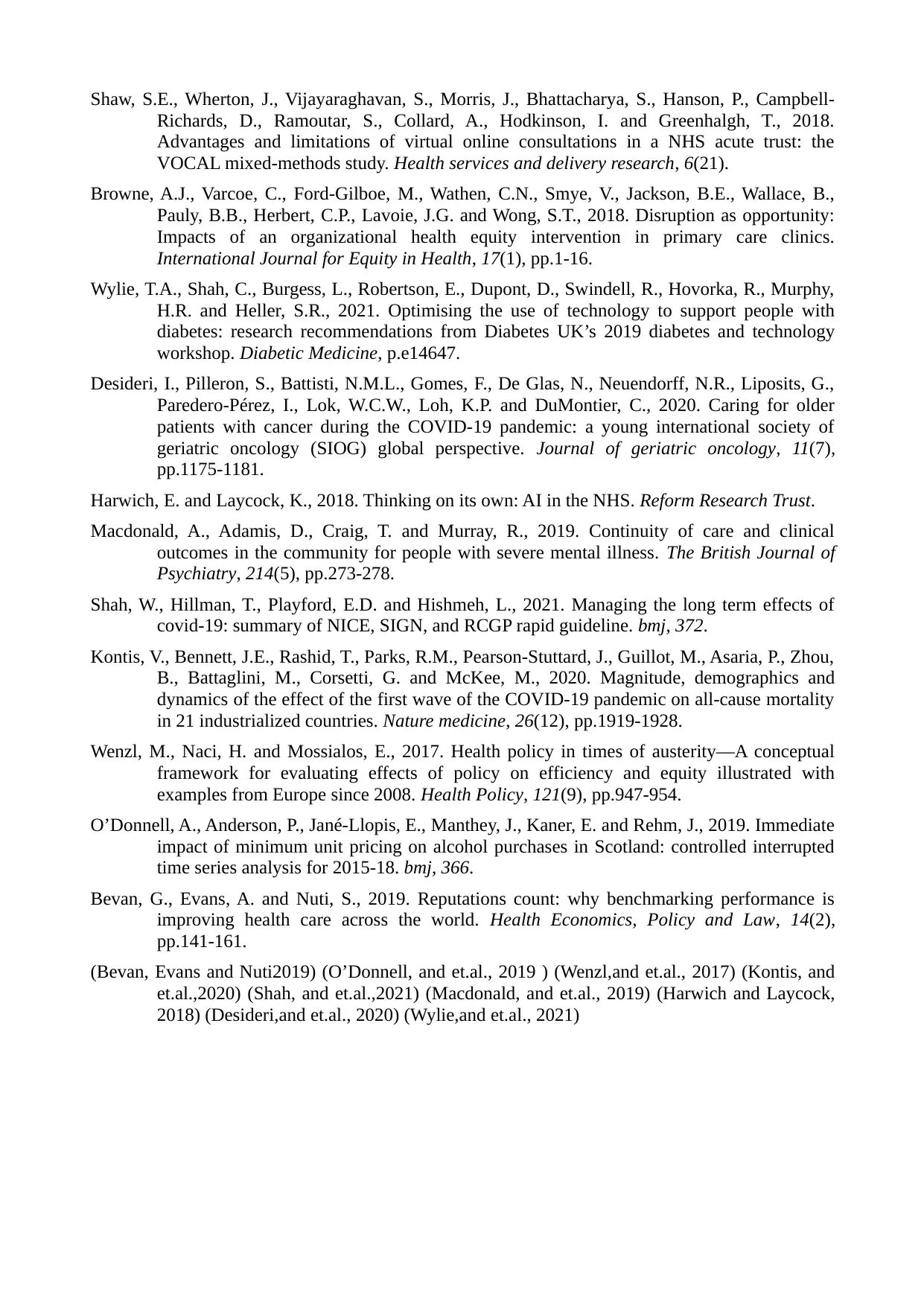
Shaw, S.E., Wherton, J., Vijayaraghavan, S., Morris, J., Bhattacharya, S., Hanson, P., Campbell-
Richards, D., Ramoutar, S., Collard, A., Hodkinson, I. and Greenhalgh, T., 2018.
Advantages and limitations of virtual online consultations in a NHS acute trust: the
VOCAL mixed-methods study. Health services and delivery research, 6(21).
Browne, A.J., Varcoe, C., Ford-Gilboe, M., Wathen, C.N., Smye, V., Jackson, B.E., Wallace, B.,
Pauly, B.B., Herbert, C.P., Lavoie, J.G. and Wong, S.T., 2018. Disruption as opportunity:
Impacts of an organizational health equity intervention in primary care clinics.
International Journal for Equity in Health, 17(1), pp.1-16.
Wylie, T.A., Shah, C., Burgess, L., Robertson, E., Dupont, D., Swindell, R., Hovorka, R., Murphy,
H.R. and Heller, S.R., 2021. Optimising the use of technology to support people with
diabetes: research recommendations from Diabetes UK’s 2019 diabetes and technology
workshop. Diabetic Medicine, p.e14647.
Desideri, I., Pilleron, S., Battisti, N.M.L., Gomes, F., De Glas, N., Neuendorff, N.R., Liposits, G.,
Paredero-Pérez, I., Lok, W.C.W., Loh, K.P. and DuMontier, C., 2020. Caring for older
patients with cancer during the COVID-19 pandemic: a young international society of
geriatric oncology (SIOG) global perspective. Journal of geriatric oncology, 11(7),
pp.1175-1181.
Harwich, E. and Laycock, K., 2018. Thinking on its own: AI in the NHS. Reform Research Trust.
Macdonald, A., Adamis, D., Craig, T. and Murray, R., 2019. Continuity of care and clinical
outcomes in the community for people with severe mental illness. The British Journal of
Psychiatry, 214(5), pp.273-278.
Shah, W., Hillman, T., Playford, E.D. and Hishmeh, L., 2021. Managing the long term effects of
covid-19: summary of NICE, SIGN, and RCGP rapid guideline. bmj, 372.
Kontis, V., Bennett, J.E., Rashid, T., Parks, R.M., Pearson-Stuttard, J., Guillot, M., Asaria, P., Zhou,
B., Battaglini, M., Corsetti, G. and McKee, M., 2020. Magnitude, demographics and
dynamics of the effect of the first wave of the COVID-19 pandemic on all-cause mortality
in 21 industrialized countries. Nature medicine, 26(12), pp.1919-1928.
Wenzl, M., Naci, H. and Mossialos, E., 2017. Health policy in times of austerity—A conceptual
framework for evaluating effects of policy on efficiency and equity illustrated with
examples from Europe since 2008. Health Policy, 121(9), pp.947-954.
O’Donnell, A., Anderson, P., Jané-Llopis, E., Manthey, J., Kaner, E. and Rehm, J., 2019. Immediate
impact of minimum unit pricing on alcohol purchases in Scotland: controlled interrupted
time series analysis for 2015-18. bmj, 366.
Bevan, G., Evans, A. and Nuti, S., 2019. Reputations count: why benchmarking performance is
improving health care across the world. Health Economics, Policy and Law, 14(2),
pp.141-161.
(Bevan, Evans and Nuti2019) (O’Donnell, and et.al., 2019 ) (Wenzl,and et.al., 2017) (Kontis, and
et.al.,2020) (Shah, and et.al.,2021) (Macdonald, and et.al., 2019) (Harwich and Laycock,
2018) (Desideri,and et.al., 2020) (Wylie,and et.al., 2021)
Richards, D., Ramoutar, S., Collard, A., Hodkinson, I. and Greenhalgh, T., 2018.
Advantages and limitations of virtual online consultations in a NHS acute trust: the
VOCAL mixed-methods study. Health services and delivery research, 6(21).
Browne, A.J., Varcoe, C., Ford-Gilboe, M., Wathen, C.N., Smye, V., Jackson, B.E., Wallace, B.,
Pauly, B.B., Herbert, C.P., Lavoie, J.G. and Wong, S.T., 2018. Disruption as opportunity:
Impacts of an organizational health equity intervention in primary care clinics.
International Journal for Equity in Health, 17(1), pp.1-16.
Wylie, T.A., Shah, C., Burgess, L., Robertson, E., Dupont, D., Swindell, R., Hovorka, R., Murphy,
H.R. and Heller, S.R., 2021. Optimising the use of technology to support people with
diabetes: research recommendations from Diabetes UK’s 2019 diabetes and technology
workshop. Diabetic Medicine, p.e14647.
Desideri, I., Pilleron, S., Battisti, N.M.L., Gomes, F., De Glas, N., Neuendorff, N.R., Liposits, G.,
Paredero-Pérez, I., Lok, W.C.W., Loh, K.P. and DuMontier, C., 2020. Caring for older
patients with cancer during the COVID-19 pandemic: a young international society of
geriatric oncology (SIOG) global perspective. Journal of geriatric oncology, 11(7),
pp.1175-1181.
Harwich, E. and Laycock, K., 2018. Thinking on its own: AI in the NHS. Reform Research Trust.
Macdonald, A., Adamis, D., Craig, T. and Murray, R., 2019. Continuity of care and clinical
outcomes in the community for people with severe mental illness. The British Journal of
Psychiatry, 214(5), pp.273-278.
Shah, W., Hillman, T., Playford, E.D. and Hishmeh, L., 2021. Managing the long term effects of
covid-19: summary of NICE, SIGN, and RCGP rapid guideline. bmj, 372.
Kontis, V., Bennett, J.E., Rashid, T., Parks, R.M., Pearson-Stuttard, J., Guillot, M., Asaria, P., Zhou,
B., Battaglini, M., Corsetti, G. and McKee, M., 2020. Magnitude, demographics and
dynamics of the effect of the first wave of the COVID-19 pandemic on all-cause mortality
in 21 industrialized countries. Nature medicine, 26(12), pp.1919-1928.
Wenzl, M., Naci, H. and Mossialos, E., 2017. Health policy in times of austerity—A conceptual
framework for evaluating effects of policy on efficiency and equity illustrated with
examples from Europe since 2008. Health Policy, 121(9), pp.947-954.
O’Donnell, A., Anderson, P., Jané-Llopis, E., Manthey, J., Kaner, E. and Rehm, J., 2019. Immediate
impact of minimum unit pricing on alcohol purchases in Scotland: controlled interrupted
time series analysis for 2015-18. bmj, 366.
Bevan, G., Evans, A. and Nuti, S., 2019. Reputations count: why benchmarking performance is
improving health care across the world. Health Economics, Policy and Law, 14(2),
pp.141-161.
(Bevan, Evans and Nuti2019) (O’Donnell, and et.al., 2019 ) (Wenzl,and et.al., 2017) (Kontis, and
et.al.,2020) (Shah, and et.al.,2021) (Macdonald, and et.al., 2019) (Harwich and Laycock,
2018) (Desideri,and et.al., 2020) (Wylie,and et.al., 2021)
1 out of 12
Related Documents
Your All-in-One AI-Powered Toolkit for Academic Success.
+13062052269
info@desklib.com
Available 24*7 on WhatsApp / Email
![[object Object]](/_next/static/media/star-bottom.7253800d.svg)
Unlock your academic potential
© 2024 | Zucol Services PVT LTD | All rights reserved.





